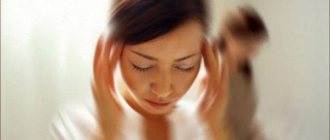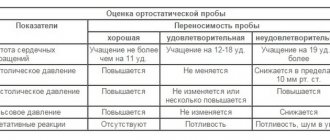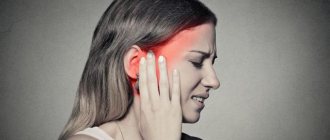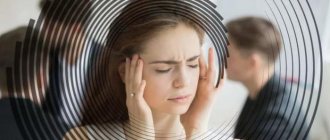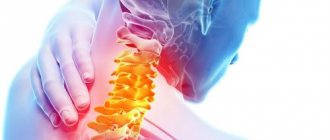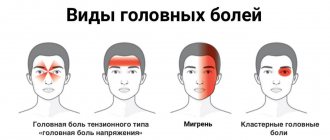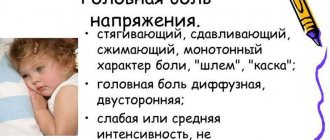Possible causes of dizziness
Perfectly healthy people, both adults and children, may periodically feel dizzy. This is a normal process, the reasons for which may be:
- adrenaline rush. When a person experiences severe stress, for example, preparing for an important performance, flying on an airplane, preparing for a parachute jump, etc., a huge amount of adrenaline, a hormone that constricts blood vessels and blocks the delivery of oxygen to the brain, is injected into his blood;
- a rapid, sharp change in body position, for example, a sharp transition from a horizontal to a vertical position, turning the body in space, riding on a swing. Dizziness can begin because a person has an undeveloped vestibular apparatus, unable to quickly adapt and perceive nerve impulses. In adolescents, such dizziness is observed extremely often and is associated mainly with the rapid growth of blood vessels, including those located in the brain;
- hypoglycemia. When the brain does not receive enough glucose, a person experiences dizziness. Vertigo is a common occurrence for office workers, students, schoolchildren and all other busy people who ignore the need for a standardized eating schedule and fill their hunger with unhealthy snacks;
- defocused gaze. When a person looks at distant objects for a long time, for example, looks out of an airplane window at the landscapes passing below, and then sharply tries to focus his gaze on closer objects, he will get the impression that they are spinning. This is due to the fact that when looking at distant objects, the eye muscles were relaxed, and to more clearly view a nearby object, the muscles need to be tense.
Dizziness as a symptom of traumatic brain injury:
- after a strong blow to the head, symptoms such as dizziness (in extreme cases, loss of consciousness), intense headaches, weakness and poor health, nausea and vomiting are usually observed (a person feels most sick after a severe concussion). As a result of a traumatic brain injury, the blood vessels of the brain are damaged and numerous pinpoint hemorrhages are possible;
- dizziness is caused by post-traumatic cerebral edema. With a concussion, dizziness is minimal or may not be present at all;
- The severity of symptoms depends on the severity of the injury. The higher it is, the more intense the symptoms. At the same time, no matter how a person with a head injury feels, good or bad, he needs to urgently go to the emergency room;
- a teenager or child who has suffered a traumatic brain injury must be immediately shown to a traumatologist and neurologist, regardless of the severity of the injury. The fact is that from the moment of injury to the first symptoms in children, up to 3 days pass (in adults, on the contrary, symptoms of injury appear immediately).
Types of dizziness
Vertigo can be divided into the following types:
- Spicy . Such dizziness develops with acute viral infections, inflammation of the middle ear, food allergies, and ear injuries. Acute vertigo occurs suddenly. Often small children become very frightened by this condition and scream. As a rule, in this case the skin becomes very pale. The child experiences increased sweating. Nystagmus may develop. Sometimes babies complain of ringing in the ears and darkening of the eyes. In rare cases, optic nerve palsy occurs. During periods of acute dizziness, children either fall or try to lean against a wall or other object. If there are disorders in the brain, the child may experience memory loss regarding events before the onset of vertigo.
- Periodic . This type of vertigo often occurs with basilar migraine or congenital torticollis. Symptoms of periodic dizziness are similar to acute vertigo, but occur regularly, alternating with an asymptomatic period.
- Poor balance and persistent dizziness. This type of vertigo develops against the background of dysfunction of the vestibular apparatus or congenital anomalies of the central nervous system. As a rule, a child suffering from the listed diseases has great difficulty learning to skate and bicycle. In children, you may notice a lack of clarity in coordination. Such children are prone to frequent injuries. The child may complain of headaches and ringing in the ears. During examinations, such children often reveal hearing impairment, kidney dysfunction, and dysfunction in the endocrine system.
- Abnormal. This type of dizziness occurs as a consequence of a course of certain drugs: aminoglycosides, diuretics, anticonvulsants, amitriptyline. In addition to vertigo, children experience hearing loss and tinnitus.
Abnormal dizziness can occur with migraines that are hereditary. Migraines appear periodically in children; as a rule, their onset is accompanied by increased irritability and disobedience.
Vertigo occurs simultaneously with unilateral head pain. If the child does not yet know how to speak, at the time of such attacks he grabs his head and screams.
Vertigo can also develop during a seizure and last only a few seconds. In some cases, children lose consciousness and then have no memory of it. These children may develop depression.
Medicines and drugs that cause dizziness
All side effects from taking certain medications are indicated in the instructions. Particularly pronounced side effects associated with vertigo are observed with the following drugs:
- allergy medications (especially Diphenhydramine, which is now used extremely rarely and only by prescription);
- potent tranquilizers and sedatives;
- some antibiotics.
When smoking, a feeling of dizziness is caused by nicotine, a substance that dilates blood vessels in the brain.
After drinking alcohol, dizziness is caused by ethyl poisoning and by-products of its processing. The stronger the poisoning, the more pronounced the “hangover syndrome,” accompanied by a feeling of weakness, severe headache, and general intoxication of the body.
Etiology and clinical manifestations of vestibulopathies in children
Why do vestibular disorders appear? The causes of dizziness in children are very different. They include pathology of the nervous, cardiovascular systems, as well as the vestibular apparatus.
| Causes | Pathological conditions |
| Diseases of the auditory analyzer | Meniere's disease, labyrinthopathy, hearing aid injuries, paroxysmal vertigo, otitis media. |
| Neurological conditions | Migraines, hypoxia during childbirth, in utero, vegetative-vascular dystonia, hyperactivity syndrome, hydrocephalic syndrome. |
| Pathologies of the spinal column | Osteochondrosis of the cervical spine, scoliosis. |
| Volumetric brain tumors | Cysts, abscesses, brain tumors, including cerebellum, metastases. |
| Diseases of the heart and blood vessels | Hypertension, hypotension, arrhythmias, anemia. |
| Toxic conditions | Smoking, poisoning with heavy metals, alcohol-containing drinks, medications (ototoxic drugs: Diclofenac, Ibuprofen, Enalapril, Streptomycin, Lidocaine). |
| Injuries | Skull injuries, falls from a height, fractures of the cervical spine, blows to the back of the head, ear. |
| Other states | Prolonged fasting, hypoglycemia, diabetes mellitus, the presence of helminthic infestations, infectious diseases (paratitis, acute respiratory infections, ARVI), neuroinfections (meningitis, arachnoiditis), neurotic disorders, torticollis. |
Most often, dizziness in a teenager develops due to hormonal changes in the body. They provoke the onset of autonomic dysfunction (VSD). As the disease progresses, migraine headaches, hypotension, and hypertension may occur, causing vestibular disorders.
Dizziness in a teenage girl can be caused by heavy menstruation due to severe blood loss.
Dizziness and nausea in a teenager often occur due to poisoning with heavy metals, toxic substances, taking ototoxic drugs, drinking alcohol, drug overdose, and increased intracranial pressure. Symptoms of vertigo during puberty appear with meningitis and tumors. In adolescent boys, you should think about the presence of an addiction to smoking, head injury, or ear injury. In addition to organic, infectious, vestibular causes in adolescents, dizziness can appear against the background of stressful situations, neuroses, cardioneuroses, and panic attacks. In this case, a psychotherapist can help the child.
Paroxysmal vestibulopathies occur in children under 3 years of age. This type of dizziness in a 10-year-old child goes away on its own or with adequate therapy. Vestibulopathies in young children are often caused by parasitic infections, intestinal infections, and hypoxic brain damage. An 8-year-old child develops dizziness due to Meniere's disease. This pathology is accompanied by high pressure in the tubules of the vestibular apparatus. The disease debuts at the age of 3 years and then subsides by 10 years.
Symptoms of vestibular disorders
A common manifestation of vestibulopathies is horizontal nystagmus (rhythmic eye movements), unsteady gait, and falls. These symptoms are objective for the doctor when examining the patient. Children and adolescents complain of a feeling of rotation of surrounding objects or their body, and tinnitus. Vertigo is accompanied by nausea and vomiting (in severe cases). With intestinal infections and parasitic infestations, the clinical complex is accompanied by abdominal pain and stool abnormalities (the child feels sick). With viral and bacterial infections in children, a high temperature is recorded. Adolescents with VSD experience weakness, headaches, sleep disturbances, and constant fatigue. Patients react to weather changes.
Dizziness comes in varying intensity and duration.
Hydrocephalic syndrome has a characteristic symptom: severe headaches in the morning, accompanied by vomiting, which does not bring relief. In the evening the symptoms are slightly weaker.
Meniere's disease is manifested by the child's complaints of hearing loss, tinnitus, and an unsteady gait. Vertigo worries patients constantly.
What diseases can cause dizziness?
Among the diseases that can cause dizziness in a teenage child:
- vegetative-vascular dystonia. An overwhelming number of cases of dizziness in adolescents are associated with this disorder. If it is diagnosed in time and treated correctly, it will disappear after some time;
- acetone crisis (more often diagnosed in children at an early age than in adolescents);
- infectious diseases: encephalitis and meningitis. In addition to dizziness, they are accompanied by extremely poor health and high fever;
- congenital or acquired arterial hypotension;
- epilepsy.
Types of dizziness
Dizziness in children can be caused by various reasons.
Vestibulopathies can be pathological or physiological. A pathological type of disease appears due to the presence of infectious or non-infectious diseases. Physiological dizziness develops when being in stuffy rooms, hyperventilation (frequent, deep breathing), sudden rotational or linear movement. Physiological vestibular disorders in a child arise due to untimely adaptation of the vestibular apparatus to changes in body position. The symptoms go away within a few minutes on their own, do not bother the baby, and do not require help.
Dizziness can be central or peripheral.
Central vestibulopathies occur with pathological damage to the vestibular nuclei, as well as other brain structures (tumors, ischemia, hemorrhages), which contribute to the conduction of nerve impulses from the vestibular apparatus and back. The imaginary sensation of rotation can be periodic or constant. Peripheral vestibulopathy is caused by a disruption in the functioning of the vestibular apparatus itself. These pathologies necessarily require diagnostic and therapeutic measures.
Doctors' answers
Hello, Victoria Viktorovna Semenova
Vomiting and dizziness can occur with increased intracranial pressure, intestinal infection, food poisoning, inflammation of the pancreas, biliary system. There is currently a gastroenteritis clinic. Considering that the child’s temperature rose to 38, and the next day the temperature returned to normal, it is more likely that foodborne toxic infection is occurring. Dizziness and weakness are a consequence of intoxication of the body. At this point, you need to take your child to an infectious disease specialist for examination and a thorough history taking. It is also necessary to take a general and biochemical blood test, a general urine test, and a stool test for the intestinal group. FGDS and ultrasound of the abdominal organs may be required to exclude pancreatitis and biliary tract pathology. During vomiting, the body loses fluid, so it is necessary to ensure an adequate drinking regimen: drinking frequently in small sips. Rehydration is best done with saline solutions (Regidron). If at the time of examination the doctor diagnoses signs of dehydration, intravenous fluids may be required.
Now look at the general condition of the child. If it worsens, you should seek medical help. If the condition is stable, then the child can be observed for up to 3 days. If nothing changes, you will need to see a doctor in person for examination and examination. Considering the symptoms, one can suspect a disorder based on psycho-emotional factors. The child may be under a lot of stress, for example there is a problem at school. Therefore, for now, provide the child with emotional peace, tell her that she may not go to school tomorrow, and monitor her well-being today and tomorrow. Along the way, carefully try to find out how things were at school and whether there was a head injury. Do not force feed, only according to your appetite. But be sure to drink at least 1.5 liters of liquid per day. But, besides stress, there are many other causes of vomiting and dizziness, so be sure to monitor the girl.
Diagnosis and treatment measures for vestibulopathies
To determine treatment tactics, the doctor must carry out a differential diagnosis of vestibulopathies of peripheral or central origin with other diseases that cause dizziness.
Differential diagnosis is carried out with the following pathological conditions:
- Intestinal infections.
- Head injuries.
- Worm infestations.
- Vegetative-vascular dystonia.
- Neoplasms of the brain.
- Neuroinfections.
- Acute respiratory conditions.
- Poisoning.
A child suffering from dizziness should visit a neurologist and otolaryngologist
If a child complains to parents about dizziness, then it is necessary to consult a pediatrician. The doctor will collect anamnesis from the parents for the presence of hypoxia during pregnancy and childbirth, torticollis, hyperactivity syndrome, and head injuries. The pediatrician will examine the child and prescribe the necessary clinical minimum (general blood and urine tests). If necessary, the doctor will refer the patient for a consultation with an otolaryngologist and neurologist to clarify the diagnosis.
The otolaryngologist will conduct an audiometric test to determine whether there is hearing loss. The neurologist will check balance tests (Romberg, Unterberger, Babinsky-Weil), the presence of eye nystagmus, and will also refer you to neurosonography and magnetic resonance imaging to assess the condition of the brain structures. If an intestinal infection or helminthiasis is detected, consultation with an infectious disease specialist is required. In severe cases, the child is hospitalized in a hospital.
What makes you feel dizzy?
Dizziness cannot be ignored. Even in an isolated case, it is recommended to establish the exact cause in order to protect yourself.
Physiological reasons
There are a number of physiological reasons associated with the transitional age of adolescents or with the characteristics of the human body.
- Production of adrenaline in the body . During an exam or any other exciting situation, a hormone called adrenaline is released into the human blood. It actively constricts blood vessels and prevents the flow of oxygen to the brain, which causes dizziness.
- Motion sickness . In this situation, dizziness is due to the fact that the brain does not correlate the readings of the vestibular apparatus and the surrounding environment. In adolescents, the blood vessels located in the brain are developing, so their function may not be accurate. As a rule, this occurs during a long trip by transport or on a watercraft.
- Fasting/dehydration . Diets are common among teenage girls, but due to active growth, the body needs an increased amount of nutrients. Due to starvation or dehydration, they are not absorbed into the body, causing dizziness.
- Excessive physical activity . During training, the body spends more useful elements to maintain its general condition. If there is more energy expended than consumed, the teenager may become dizzy.
Up to 14 years old
At the age of 14-15 years, vegetative-vascular dystonia develops. It occurs against the background of functional changes characteristic of every child. With proper treatment, the disease goes away and no longer bothers you in adulthood.
At 15-17 years old
At this age, adolescents develop secondary sexual characteristics, which is caused by hormonal changes. Teenagers are actively growing and gaining weight. Together, these factors can lead to dizziness.
Should you be concerned if you feel dizzy when getting out of bed?
Almost all of us periodically ask ourselves the question: “Why do I get dizzy when I get out of bed?”
First of all, it should be noted that dizziness during a sharp rise is not a disease in itself. Often this is just a signal from your body about problems with its functioning.
But if dizziness is not an isolated case for you, then this should be a reason to go to the doctor and get diagnosed.
Vertigo (the scientific term for dizziness) sometimes occurs as a result of a lack of oxygen to brain cells. However, a clear etiology for this condition is difficult to identify. First you need to understand the additional symptoms.
Causes of dizziness
If you experience dizziness when standing up suddenly, but there are no other symptoms, then the reasons may be the following:
- Orthostatic hypotension. If you stay in a certain position for a long time, blood from the brain will begin to flow to the limbs. The brain gives a command to constrict blood vessels. With a sudden change in body position, the vessels do not dilate in time; blood flow to the brain is inhibited. Short-term oxygen starvation develops, and the person experiences dizziness. Usually the attacks last no more than four seconds. This is a normal phenomenon and healthy people do not notice it.
- Puberty. Dizziness is especially common in teenagers. The cardiovascular system lags behind the rapid pace of development of the entire organism. The vessels do not have optimal patency, oxygen does not have time to reach the brain in time. If your child has low blood pressure, the risk of dizziness increases.
- Menstruation. These days, women experience a significant decrease in hemoglobin, as the consumption of red blood cells increases many times. In this state, women often complain: “I feel dizzy when getting out of bed.”
- Pregnancy. The head feels dizzy at almost all stages of gestation. When standing up suddenly, dizziness can occur for various reasons: hormonal changes, lack of nutrients, low hemoglobin.
- Dehydration.
- Long stay on bed rest.
- Lack of glucose, for example, after a strict diet. Long breaks between meals also provoke a lack of essential nutrients for normal brain function.
- Side effects of medications. Usually the presence of such a side effect is mentioned in the instructions for the drug.
- Stress. In nervous situations, the body experiences a surge of adrenaline and a simultaneous spasm of the arteries of the brain, which provokes difficulties in the flow of blood along with oxygen to the cerebral cortex.
- Nicotine poisoning. A similar symptom occurs when smoking the first “morning” cigarette on an empty stomach.
In all these cases, you can do without the help of a specialist. Vertigo accompanies the body's natural processes. After a while everything will return to normal.
In some individual cases, you should reconsider your lifestyle, give up bad habits, improve your diet, include vitamins in your diet, provide the body with the necessary amount of fluid, spend more time in the fresh air and alternate static activities with dynamic ones (walking or sports).
Dizziness as a symptom of illness
Dizziness when getting out of bed may be accompanied by other specific symptoms that vary depending on the disease. This may include darkening of the eyes, nausea or vomiting, profuse sweating, fainting, and much more.
In this case, you will no longer be able to do without contacting a competent specialist.
What diseases cause you to feel dizzy when standing up?
- Ear diseases. The inner ear is one of the most important elements in the body. It is filled with liquid, with the help of which we accurately determine the position of our body in space. But when inflammation or injury to the ear occurs, the amount of fluid changes in volume and blood flow is disrupted. The pressure in the inner ear increases, which leads to dizziness, which is accompanied by illusory sounds, noise or ringing, congestion, and deafness. Such symptoms indicate infectious inflammation, traumatic brain injury to the temporal part, and a possible brain tumor.
- Dysfunction of the vestibular apparatus. As you know, it is this structure that provides a sense of balance. It transmits impulses to the brain about the position of the body in space. The brain responds by adjusting muscle function depending on body position. And if the vestibular apparatus does not function correctly, then you may feel dizziness and nausea.
- Cervical osteochondrosis. It is characterized by calcification of the intervertebral joints, which, when moving the head, can provoke stretching and damage to nerves and blood vessels. Because of this, the brain may not receive the required portion of oxygen, which will manifest itself as dizziness when getting out of bed. Attacks are observed during periods of exacerbation and are aggravated by hypothermia, excessive stress and long periods of sitting in a sitting position.
- Disturbances in brain activity can cause dizziness. This happens most often due to vascular dysfunction. With various types of brain anomalies, congenital or acquired, the vessels are no longer able to ensure the distribution of blood flow in the required volume and at the required speed. This leads to oxygen starvation. There may be several root causes: concussion, epilepsy, tumor, cerebral atherosclerosis. Dizziness during a concussion is the first symptom. Therefore, if you have a similar symptom, remember if you have had any head injuries recently. After all, a mild concussion can manifest itself after some time.
- Diseases of the cardiovascular system. Failure of the heart rhythm leads to ailments such as dizziness when rising from a horizontal position. At the same time, blood is not produced in the required volume, and its movement is intermittent. The required amount of oxygen is not delivered to the brain, which causes pre-fainting conditions. Causes: vegetative-vascular dystonia, heart disease, hypertensive crisis.
- Poisoning. General intoxication causes a painful condition, in particular accompanied by dizziness.
Dizziness with the diseases and injuries listed above is only their symptom. Therefore, the treatment process, as a rule, is aimed at combating not dizziness, but the pathology that caused it.
First, you need to contact a therapist who will prescribe tests and instrumental examinations. Based on their results, he will make a diagnosis or refer you to another doctor with a more narrow specialization.
Precautionary measures
- You need to develop the habit of waking up and getting out of bed correctly. Firstly, you should not rush to get up immediately when the alarm clock sounds. You need to turn over on your side and bend your back slightly, trying to stretch the fingers of your upper and lower extremities as far as possible. Then turn on the other side and press your knees to your chest. Lie on your back and straighten up. Slowly lower your legs to the floor and slowly straighten your back. After taking a few deep breaths, you can leave the bed. This simple procedure will help activate the cardiovascular system, relaxed after sleep.
- You should not sit in one position for a long time at work or at the computer. You need to change your body position often, but not abruptly, but first take deep breaths several times.
- It is necessary to ensure that a sufficient amount of vitamins and water enters the body with food.
- Include at least light physical activity in your daily routine.
- Give up bad habits.
If you experience dizziness occasionally, and it lasts only a few seconds, then do not panic.
Your body is simply giving you a signal that it is tired.
You need to change your usual pace of life and give yourself a little rest. If, along with frequent dizziness, you have other painful manifestations, then you should go to a specialist and conduct a qualified examination to find out why you feel dizzy when you get up.
After all, any illness can be treated better if it is diagnosed earlier.
Source: https://golovnie-boli.com/golovokruzhenie/pri-vstavanii-s-krovati.html
Frequent ailments can be a symptom of what diseases?
Dizziness in itself is not a disease . It must be remembered that if a teenager’s head is constantly spinning, then this is only a separate symptom that may indicate a serious or not so serious pathology. Diseases with symptoms of dizziness:
- Meniere's disease . This is a disease of the inner ear that is characterized by poor hearing, ringing in the ears and dizziness. It is chronic, only mitigation of symptoms is possible.
- Viral meningitis . This is a disease characterized by an inflammatory process in the membrane area. Dizziness is sometimes observed, indicating an effect on the central nervous system.
- Vestibular migraine . A disease characterized by severe headache. In approximately 40% of patients it is accompanied by dizziness.
- Vegetative-vascular dystonia . A disease characterized by disturbances in blood circulation. In most cases, frequent dizziness is a symptom of this disease.
- Hypertension and hypotension . Diseases indicating an increase or decrease in blood pressure. In each case, the flow of blood and oxygen to the brain is disrupted, causing dizziness.
- Sinusitis . If the disease is chronic, then less oxygen reaches the brain, which leads to dizziness.
- Otitis . When the disease occurs, the hearing system is impaired, tinnitus appears, which causes dizziness.
Find out more about what symptoms of dizziness are symptoms here, and read about why frequent dizziness occurs and whether they are dangerous, read in this material.
Dizziness in children - the most common causes
When a person is in a state of balance, three systems work harmoniously in his body: the visual, proprioceptive and vestibular apparatus. If there is a malfunction in the activity of impulses and signals, the position of the eyeballs is disrupted and the illusion of rotating one’s body or objects around appears. This condition is called dizziness.
Dizziness is a feeling of imbalance of the body and apparent rotation (of surrounding objects around the body, one’s own body, or rotation inside the head). Dizziness in children varies in intensity and is often accompanied by nausea, vomiting, slow heart rate, pallor, and changes in blood pressure. The balance organ is responsible for the feeling of balance in the body: the vestibular apparatus, located in the inner ear and supplying information to the vestibular nuclei of the brain. More than 70% of dizziness is caused by disorders of the inner ear, at the same time, there are more than 300 diseases that are accompanied by dizziness, so systematic disorders of orientation in space cannot be ignored. If discomfort occurs after a minor injury, then it is quite obvious why a small child feels dizzy. In other cases, you should pay close attention to the symptoms and consult a doctor if anything worries you.
An unpleasant feature is that children cannot always correctly describe a new sensation. If you notice unusual behavior, be sure to ask your baby how he is feeling.
How can you tell if a small child is dizzy?
If a child is dizzy and does not yet know how to speak, the pathological condition can be determined by the following external signs
- Children's behavior changes. Usually, they close their eyes, lie face down, press tightly against the wall or back of the crib and do not want to move. The baby leans his head against something (for example, a crib) in an attempt to fix the position and stop the rotation of objects, and closes his eyes.
- Older children do not want to get out of bed after suffering from illnesses.
- The baby, with a confused and incomprehensible look, is distracted from his activity, be it a book or a game.
- In some cases, nystagmus (rapid involuntary movement of the eyeballs) may be observed.
Why does this happen?
- Weakness of the vestibular apparatus. Kinetosis is a motion sickness (motion sickness).
- Diseases of the inner and middle ear (inflammation, trauma, etc.).
- Brain diseases (including brain tumor).
- Pathology of cerebral vessels. Disorders of the autonomic nervous system (vegetative-vascular dystonia - VSD).
- Inflammatory diseases of the brain (meningitis, encephalitis, etc.).
- Diseases of the endocrine system.
- Trauma (concussion).
- Toxic effects on the brain.
- Intoxication during infectious diseases.
- Poisoning (mushrooms, drugs, alcohol, snake venom, etc.).
- Parasitosis.
- Reduced hemoglobin with anemia and other reasons.
- Excessive physical stress.
- Low blood sugar.
- Feeling very hungry.
- Food allergies.
- Prolonged bathing in hot water is also a very common cause of dizziness in children.
- Children tend to try something unusual and new to them. This could easily include medical supplies left by careless parents in an accessible place. Using them unnecessarily or overdosing them can cause various symptoms, and dizziness is far from the worst of them. Therefore, parents need to be extremely careful that the home first aid kit is kept out of the reach of children.
Kinetosis develops due to irritation of the receptors of the organs of balance, vision and internal organs, caused by acceleration of movement and changes in body position. A completely healthy person can experience imbalance and dizziness when the vestibular system is overstimulated (for example, swinging on a swing, on a merry-go-round, seasickness, during airplane takeoff, etc.). However, the vestibular system of many people, especially children, is overly sensitive to irritation, and they find it difficult to endure even a regular trip in public transport. Kinetosis is promoted by physical fatigue, emotional stress, menstruation, the first months of pregnancy, concussion, poor room lighting, and unpleasant odors.
Symptoms of kinetosis and their severity are varied. In a mild degree, it manifests itself as weakness, headache, nausea, and loss of balance. The following symptoms are also encountered: severe dizziness, tinnitus, drooling, belching, increased appetite, vomiting, abdominal pain, diarrhea, pallor, cold sweat, palpitations, discomfort in the heart area, yawning, chills (even fainting).
For a healthy baby, kinetosis does not pose a serious danger and ends without consequences as soon as the irritating factor stops (for example, sudden acceleration and changes in body position). But it can cause a weakening of cardiac activity in children with cardiovascular diseases, provoke strangulated hernia, exacerbation of some chronic diseases, etc.
Different sources and causes cause different forms of dizziness, differing in frequency, duration and severity of the ailment.
- Single (acute).
- Regular or periodic.
- Permanent.
- Accompanied by migraine.
Spicy . The attack develops suddenly, the sensations are strong: babies scream, and older children complain of hearing loss, ringing in the ears, and photophobia. Uncharacteristic movements of the eyeballs may be observed. The child feels dizzy and during an attack he tries to lean against some surface or lie down. The cause may be infectious diseases, damage to the middle ear, fatigue, or allergies. As a rule, these types of attacks have no consequences. The exception is when dizziness occurs due to changes in the structure of the brain (tumor).
Periodic . It manifests itself in the same way as acute. A series of attacks is replaced by a period of their complete absence. Possible causes: torticollis, basilar disease.
Permanent . Accompanied by imbalance and delayed development of all motor skills. Children report tinnitus and headaches, but lack coordination, which increases the risk of injury. The examination reveals problems with the kidneys and endocrine system. A personality disorder may occur. Symptoms often include excessive discharge from the ears. Causes: congenital defect of the central nervous system and disorder of the vestibular apparatus.
In what cases should you consult a doctor?
It is imperative to show your child to a pediatrician in cases where:
- attacks are often repeated;
- there are complaints of headache;
- dizzy for a long time (more than 20 minutes in a row);
- the baby complains of blurred vision;
- loss of consciousness occurred;
- nystagmus is observed;
- there are complaints of pain or congestion in the ears;
- the child fell and hit his head;
- immediate family members suffer from migraines.
Measures to combat kinetosis and dizziness
The child must be in good physical shape, so before the trip it is advisable to rest and sleep, as well as eat a little. You should not overload your child with dense foods: kinetosis is promoted by both an empty and a full stomach. Foods and drinks with a sour taste, cold foods (ice cream) help against nausea. On the road, you will need sour caramel and water (preferably with lemon); a large child can be offered to chew gum when motion sickness occurs.
There are also special medicines for motion sickness (aeron, air-sea, etc.). In ground transportation, sit in the front seats, as close to the driver as possible, facing forward. On a ship or plane, the most suitable seats are in the middle. While traveling, it is not recommended to read or pay attention to objects and waves swaying nearby; it is best to look into the distance. If you are on a ship, it would be appropriate to take a walk in the fresh air, and if there is a significant deterioration in health, put the child with his head tilted back. During sleep, the symptoms of kinetosis disappear, so the best remedy on a long journey is to put the child to sleep.
Monitor the water temperature when swimming. An overly hot bath causes blood to rush to the skin, vasodilation and dizziness.
Avoid dehydration. On a hot summer day, your child should drink a glass of water every hour.
If your baby wakes up at night because he is dizzy, leave the night light on throughout the night - this way the baby will be able to wake up and see some stationary object and focus on it.
How to behave if your child suddenly experiences dizziness?
- Remove external irritants: turn off bright lights, loud music, limit communication.
- If dizziness occurs while driving, focusing the child on some stationary object can help.
- If possible, give the baby a horizontal position and maintain it until the head stops spinning.
- Place a heating pad on his legs and on the back of his neck and shoulders.
- If the child wants to eat, you can feed him, limiting salt and liquid (if vomiting, liquid is not limited).
- Call a doctor.
Treatment of dizziness in a child depends on the causes that caused it. For frequent dizziness, drugs that strengthen the autonomic nervous system are usually prescribed: vitamin B6, belladonna preparations (belataminal), drugs that improve blood supply to the brain (cinnarizine, Cavinton, Sermion), vasodilators (no-spa, papaverine) and other drugs. Physiotherapy and therapeutic exercises that train the vestibular apparatus are indicated.
The balance organs are “hardened” by exercises accompanied by rapid changes in the position of the head and body (exercises on rings and uneven bars, figure skating, swinging, dancing, etc.).
- Author - Polukhina Anastasia Aleksandrovna
- 15.03.2017
- All consultations by the author
What to do for treatment?
It is necessary to get rid of dizziness in any case , since it brings a lot of trouble to its owner. Read more about treating dizziness here.
First aid at home
If a loved one complains of severe dizziness, the following algorithm should be followed:
- Place the person on a horizontal surface with their back.
- The head, shoulders and neck are elevated (not necessary, but desirable).
- Avoid any sudden head movements, tilts or turns.
- Place a damp cloth on your forehead (if possible, mix vinegar with water in a 1:1 ratio).
- Open the window to allow fresh air into the room.
- Measure your pulse.
Which doctor should I contact?
It is primarily recommended to contact a pediatrician; he will refer you for all the necessary examinations. If necessary, the attending physician will write a referral to a neurologist or neurologist .
Drug therapy
If dizziness comes over a person regularly, he should have medications with him so as not to wait for help from others.
- If you have a problem with hypertension, a person carries blockers or diuretics with him. For example, Clonidine or Phentolamine.
- If there is a problem with the circulatory system, antiplatelet agents are prescribed. For example, "Tiklid" or "Betaserk".
- If dizziness is not a consequence of any pathology, antihistamines are used. For example, "Diphenhydramine" or "Pipolfen".
All medications must be taken after consultation with a specialist.
Dizziness may indicate a number of dangerous diseases . If you notice this symptom, you must immediately consult a doctor so that he can diagnose the disease and prescribe treatment. Take care of your health!
Treatment of dizziness in teenagers
Many parents wonder what to do if their child is dizzy. The following tips will help you provide first aid:
- Immediately place the baby on his back.
- To provide air into the room, all windows must be opened.
- If you feel chills, you should cover them with a warm blanket.
- A gauze bandage soaked in cool water applied to the forehead will help improve the situation.
- If a child feels unwell, has a fever or is vomiting, call an ambulance as quickly as possible.
- Until paramedics arrive, the teenager should not be given any pills.
The most important thing that parents of a teenager should remember is the need for the child to be examined by a doctor. After all, the effectiveness of treatment and the health of the child depend on the correct diagnosis. Only a competent specialist will refer him for additional examinations that will help identify the true cause of dizziness, and also select the optimal course of treatment.
Treatment of vestibulopathies
Treatment of vestibular disorders includes drug therapy, as well as physical therapy to train the vestibular analyzer.
If dizziness and nausea occur in a child, he should be put to bed to protect him from falls and injuries, put a heating pad on his feet, and call a doctor. This symptom should not be ignored, as it may hide a serious pathology.
In severe cases, Aminazine helps relieve an attack of Meniere's disease
When Meniere's disease is detected, treatment is carried out comprehensively. During the acute period, Pipolfen is prescribed intravenously in a glucose solution, Aminazine, Atropine sulfate, mustard plasters on the cervical-occipital region, and a heating pad on the legs. To improve cerebral and vestibular blood flow, Cinnarizine and Vinpocetine are prescribed. After the acute period has passed, the patient is advised to take diuretics (Furosemide) to reduce fluid pressure in the vestibular tubules. Patients are prescribed histamine preparations according to indications, nootropics (Cinnarizine, Propranolol), glucocorticosteroid hormones. Non-drug treatment methods include physical education and acupuncture.
If an infectious disease is detected, the patient is prescribed anthelmintic, antiviral or antibacterial therapy, depending on the type of pathogen. For injuries, treatment is aimed at eliminating cerebral edema and improving blood circulation in the brain tissue. Severe hydrocephalic syndrome requires the use of diuretics, as well as the prompt installation of a shunt for constant outflow of cerebrospinal fluid. Vegetative-vascular dystonia, neurotic disorders, migraines in adolescents are treated with sedatives, nootropic drugs, and psychotherapy. For anemia, iron supplements and B vitamins are prescribed. Tumors, abscesses, and hematomas require surgical removal or puncture. For ARVI, antiviral drugs are used, in some cases homeopathy (Vibrukol) is used.
Homeopathic medicine used for colds
Feeling dizzy: causes not related to human diseases
If you feel dizzy, you lose your balance and have problems coordinating your movements. All this causes discomfort and takes away the opportunity to live and work fully.
We suggest you understand the factors that can cause dizziness. They are not associated with pathological health problems. Most often, dizziness occurs due to other spontaneous causes. What we included here:
- A sharp surge of adrenaline. For example, a person may speak publicly for the first time and be very worried because of this, and the excitement causes a surge in the hormone, which can lead to vasospasm, which, in turn, leads to the fact that the brain does not receive the required amount of oxygen, and the person my head starts to spin. In general, in such a situation, he may lose consciousness, and even memory.
- When a person rides on attractions, drives a car for a long time, and then suddenly stops, he becomes dizzy because nerve impulses are sent to the brain to which the human brain cannot quickly adapt.
- When a person looks into the distance for a long time and then turns his eyes to objects that are close, he feels as if his eyes are spinning. This happens due to the fact that the eye muscles relax greatly when you look at something for a long time and into the distance, and when you sharply move your eyes to close objects, your gaze becomes unfocused.
- If you don’t eat right and only have snacks during the day, then the brain does not receive the required amount of glucose, which often causes dizziness.
- In children and adolescents, dizziness most often occurs simply due to the fact that their vascular system is going through a formative stage. This happens, for example, when the child suddenly turns his head or bends over.
- Dizziness can be a side effect of taking antibiotics, sedatives, and other medications.
- Due to excessive consumption of alcohol and tobacco, which significantly dilate blood vessels when entering the blood, dizziness may occur.
- If you spend a lot of time in front of a computer monitor, then dizziness will certainly occur, because this increases intracranial pressure and tires your eyes.
Feeling dizzy may be due to more serious reasons. If some kind of malfunction in the functioning of internal organs has occurred in the human body, which has led to the development of a life-threatening pathology, then dizziness is the first bell indicating that it is time to turn to a specialist for qualified help.
What reasons are we talking about:
- Vertigo. This is a disease associated with the functioning of the vestibular apparatus, which is located in the inner ear. In addition to the fact that a person begins to feel very dizzy, he also begins to feel sick, his pulse skips a beat and his blood pressure drops sharply.
- Otitis is an inflammatory process in the middle ear. The pain caused by the disease causes complications such as dizziness.
- Migraine. If a person has been diagnosed with this, he will not be able to get rid of dizziness until he is cured. With this diagnosis, pain in the head is always accompanied by dizziness.
- Food or drug poisoning. Due to overintoxication of the body, a person loses a lot of fluid. His blood pressure levels begin to drop sharply, and his nerve cells are exposed to the negative effects of toxic substances. As a result, the head begins to feel dizzy and the person becomes weak.
- Traumatic brain injury of any severity. Dizziness after a strong blow is the first and compelling argument in favor of seeking help from a doctor. If this is not done, then Meniere's disease may develop; it is already infectious in nature and therefore very difficult to treat.
- Ear injury. If the membranes inside the ear rupture, then a person not only loses his hearing, he also loses his balance during a sneeze or cough - he begins to feel very dizzy.
- Osteochondrosis can become one of the most important and most common reasons due to which dizziness can occur sharply, albeit briefly.
- Stroke. Dizziness with this pathology is not the most important symptom, but one of the accompanying ones. If you have severe pain in the area of your heart, you cannot coordinate your movements, your vision is getting dark, then immediately call an ambulance.
- Brain tumor. You may not know about it for a long time, because it develops very slowly and affects vision and hearing. Dizziness occurs already when the situation is started.
- Neurosis or depression. Often a person does not clearly realize that he needs to seek help from a psychologist or neurologist, believing that dizziness occurs as a temporary symptom due to overwork.
- In pregnant women, dizziness is a sign of pregnancy and a common symptom of toxicosis. In addition, expectant mothers may feel dizzy due to overwork, iron deficiency in the blood, or the diet that is often prescribed to pregnant women by their leading gynecologist.
Dizziness in children occurs for various reasons, and children of any age can suffer from vertigo.
Unfortunately, this problem can be difficult to identify not only for parents, but also for doctors, since a small child cannot correctly describe his illness. This is especially true for children who have not yet learned to speak.
How to get rid of dizziness?
Rotation of surrounding objects around your own body, loss of a sense of stability, loss of balance, accompanied by nausea, vomiting, pale skin, weakness, and tinnitus is called dizziness. This condition can be caused by various reasons, both pathological and physiological.
The occurrence of this phenomenon is due to the fact that the inner ear supplies distorted information to the brain, which is very different from that received by the organs of hearing and vision.
Causes
Excessive emotional stress can cause dizziness
This condition occurs due to the presence of certain factors. Let's look at what the causes of dizziness in children may be.
When such a condition is not a pathology:
- in children up to the age of five, the vestibular apparatus may still continue to develop, and therefore problems with balance arise, especially under heavy load;
- dizziness may occur in the dark due to the lack of visual signal;
- severe hunger;
- low mobility;
- overheating, in particular when swimming in hot water, in a stuffy room (this also applies to very cold water);
- severe physical or emotional stress;
- Pregnancy is possible in teenage girls;
- side effects of any medications;
- hormonal changes during adolescence.
Reasons indicating a medical problem:
- consequences of injury;
- ear diseases;
- infectious diseases;
- damage to the central nervous system;
- meningitis;
- lack of glucose in the blood;
- neoplasm in the brain;
- kinetosis;
- vascular pathologies (VSD);
- encephalitis;
- anemia;
- poisoning, for example, from mushrooms or toxic fumes;
- parasitic infection;
- food allergies;
- a sharp rise in pressure, hypotension;
- scoliosis, osteochondrosis (especially in the cervical region);
- pinched nerve endings;
- pathologies of the endocrine system.
